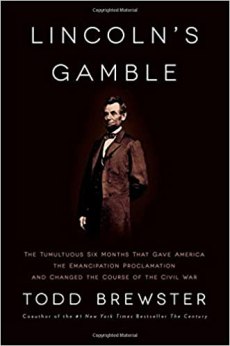 Abraham Lincoln is remembered by history as the Great Emancipator. However, when he first took office he had no plans on freeing any slaves. He first spoke of freeing the slaves in July 1862 and six months later, he issued his Emancipation Proclamation. Todd Brewster chronicles those six months in Lincoln’s life in his book Lincoln’s Gamble: The Tumultuous Six Months That Gave America the Emancipation Proclamation and Changed the Course of the Civil War.
Abraham Lincoln is remembered by history as the Great Emancipator. However, when he first took office he had no plans on freeing any slaves. He first spoke of freeing the slaves in July 1862 and six months later, he issued his Emancipation Proclamation. Todd Brewster chronicles those six months in Lincoln’s life in his book Lincoln’s Gamble: The Tumultuous Six Months That Gave America the Emancipation Proclamation and Changed the Course of the Civil War.
Brewster has provided a readable and concise account of Lincoln’s evolving beliefs regarding the continuation of slavery, from his belief in gradual compensated emancipation and colonization to his belief in the somewhat limited emancipation that was granted in the Proclamation. Brewster analyzes the multiple drafts of the Proclamation as well as Lincoln’s other writings to demonstrate Lincoln’s internal conflict between the Declaration of Independence with its guarantee that “all men…are endowed by their Creator with certain unalienable rights” and the Constitutional protection of slavery. While Lincoln ultimately, managed to find a way to reconcile this conflict, many opponents felt that his actions were unconstitutional. Contrary to the prevalent myth surrounding Lincoln, he did not act from some sort of moral certitude regarding slavery. He agonized over the decision to emancipate the slaves, questioning whether it was the right thing to do until only hours before he signed the Proclamation.
While Brewster does a good job of explaining Lincoln’s developing views on slavery, he does not break any new ground. Eric Foner’s The Fiery Trial discusses the same topic, but more in depth. Additionally, Alan Guelzo’s Lincoln’s Emancipation Proclamation addresses the writing and continuous revising of the Proclamation, although in many more words, written in much smaller font. While Lincoln’s Gamble doesn’t provide anything new regarding how and why Lincoln wrote the Emancipation Proclamation, Brewster has written a book that is perhaps more accessible to the average reader than either Foner or Guelzo. He writes in a conversational style that was both enjoyable and engaging to read. If you are only going to read one book about the Emancipation Proclamation, you would do well to make it this one.